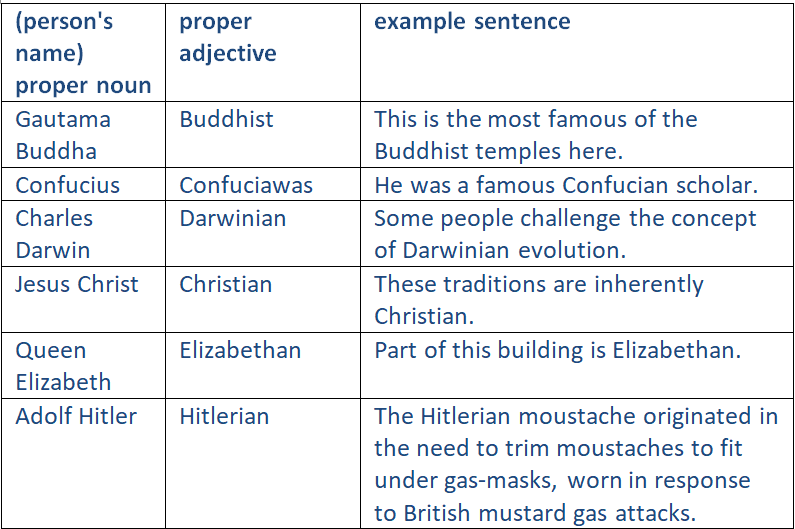

Grammar


Tenses


Present

Present Simple

Present Continuous

Present Perfect

Present Perfect Continuous


Past

Past Simple

Past Continuous

Past Perfect

Past Perfect Continuous


Future

Future Simple

Future Continuous

Future Perfect

Future Perfect Continuous


Parts Of Speech


Nouns

Countable and uncountable nouns

Verbal nouns

Singular and Plural nouns

Proper nouns

Nouns gender

Nouns definition

Concrete nouns

Abstract nouns

Common nouns

Collective nouns

Definition Of Nouns

Animate and Inanimate nouns

Nouns


Verbs

Stative and dynamic verbs

Finite and nonfinite verbs

To be verbs

Transitive and intransitive verbs

Auxiliary verbs

Modal verbs

Regular and irregular verbs

Action verbs

Verbs


Adverbs

Relative adverbs

Interrogative adverbs

Adverbs of time

Adverbs of place

Adverbs of reason

Adverbs of quantity

Adverbs of manner

Adverbs of frequency

Adverbs of affirmation

Adverbs


Adjectives

Quantitative adjective

Proper adjective

Possessive adjective

Numeral adjective

Interrogative adjective

Distributive adjective

Descriptive adjective

Demonstrative adjective


Pronouns

Subject pronoun

Relative pronoun

Reflexive pronoun

Reciprocal pronoun

Possessive pronoun

Personal pronoun

Interrogative pronoun

Indefinite pronoun

Emphatic pronoun

Distributive pronoun

Demonstrative pronoun

Pronouns


Pre Position


Preposition by function

Time preposition

Reason preposition

Possession preposition

Place preposition

Phrases preposition

Origin preposition

Measure preposition

Direction preposition

Contrast preposition

Agent preposition


Preposition by construction

Simple preposition

Phrase preposition

Double preposition

Compound preposition

prepositions


Conjunctions

Subordinating conjunction

Correlative conjunction

Coordinating conjunction

Conjunctive adverbs

conjunctions


Interjections

Express calling interjection

Phrases

Sentences

Clauses

Part of Speech


Grammar Rules

Passive and Active

Preference

Requests and offers

wishes

Be used to

Some and any

Could have done

Describing people

Giving advices

Possession

Comparative and superlative

Giving Reason

Making Suggestions

Apologizing

Forming questions

Since and for

Directions

Obligation

Adverbials

invitation

Articles

Imaginary condition

Zero conditional

First conditional

Second conditional

Third conditional

Reported speech

Demonstratives

Determiners

Direct and Indirect speech


Linguistics

Phonetics

Phonology

Linguistics fields

Syntax

Morphology

Semantics

pragmatics

History

Writing

Grammar

Phonetics and Phonology

Semiotics


Reading Comprehension

Elementary

Intermediate

Advanced


Teaching Methods

Teaching Strategies

Assessment
Proper Adjective
المؤلف:
ENGLISHCLUB.COM
المصدر:
...
الجزء والصفحة:
...
17-5-2021
1883
What are Proper Adjectives?
Most adjectives are "common adjectives". They describe people, places and things, for example:
tall man, big dog, noisy baby,large garden, empty room, beautiful city, red car, hot weather, expensive watch
"Proper adjectives" also describe people, places and things, but they are based on names and therefore need to be capitalized, like the names. For example, Spain is the name of a country and starts with a capital letter. The adjective based on Spain (Spanish) must also start with a capital letter. Mars is the name of a planet and starts with a capital letter. The adjective based on Mars (Martian) must also start with a capital letter. Shakespeare was the name of a famous writer and starts with a capital letter. The adjective based on Shakespeare (Shakespearean) must also start with a capital letter.
Since you live in Spain, do you enjoy Spanish food?
If people ever live on the planet Mars, they will have to endure the extremes of the Martian climate.
Although William Shakespeare is best known for his plays, many exams also cover Shakespearean poetry.
Proper adjectives are mostly of two types:
those that come from names of places—countries, continents, regions, cities
those that come from names of people—usually famous people, mostly historical, some modern
Proper Adjectives from Place Names (countries, continents, regions, cities)
Your country is a proper noun and it has a capitalized proper adjective. Here are a few examples of proper adjectives based on place names, and you can find a much longer list of proper adjectives based on place names here:



Proper Adjectives from People's Names (eponymous )
Your name is a proper noun and if you were super-famous it might have a capitalized proper adjective. Nouns and adjectives derived from people's names—both real and fictional—are called "eponymous". Eponymous adjectives are by definition proper adjectives. Here are a few examples, and you can find a much longer list of eponymous adjectives here:


Prefixes with Proper Adjectives
Normally, a prefix attached to a proper adjective should not be capitalized. Look at these examples:
pre-Christian
Paganism was one of many pre-Christian religions.
pan-European
The search for a pan-European identity started well before 1900.
post-Thatcherite
Did wages go up in post-Thatcherite Britain?
Note that the prefix should not be capitalized, unless it starts the sentence:
anti-Western
Anti-Western sentiment was an inevitable consequence.
If the prefix itself is formed from a proper noun, then the prefix should of course by capitalized. In the following example, Austro- comes from the proper noun Austria and Hungarian comes from the proper noun Hungary.
Austro-Hungarian
The assassination of the heir to the Austro-Hungarian throne led directly to the First World War.
In the next example, the prefix Afro- comes from the proper noun Africa, and Caribbean is the proper adjective from the proper noun Caribbean:
Afro-Caribbean
He loves Afro-Caribbean music.
Hyphenation with Proper Adjectives
The same logic applies with suffixes and other hyphenated forms—capitalize only the word or words derived from a proper noun:
English-speaking
She asked for an English-speaking guide to show her around.
When Proper Adjectives Lose their Connection
Sometimes proper adjectives lose their connection with the proper noun that gave them the right to be capitalized, for example:
gargantuan, titanic, caesarian, draconian, herculean, spartan
 الاكثر قراءة في Proper adjective
الاكثر قراءة في Proper adjective
 اخر الاخبار
اخر الاخبار
اخبار العتبة العباسية المقدسة

الآخبار الصحية















 قسم الشؤون الفكرية يصدر كتاباً يوثق تاريخ السدانة في العتبة العباسية المقدسة
قسم الشؤون الفكرية يصدر كتاباً يوثق تاريخ السدانة في العتبة العباسية المقدسة "المهمة".. إصدار قصصي يوثّق القصص الفائزة في مسابقة فتوى الدفاع المقدسة للقصة القصيرة
"المهمة".. إصدار قصصي يوثّق القصص الفائزة في مسابقة فتوى الدفاع المقدسة للقصة القصيرة (نوافذ).. إصدار أدبي يوثق القصص الفائزة في مسابقة الإمام العسكري (عليه السلام)
(نوافذ).. إصدار أدبي يوثق القصص الفائزة في مسابقة الإمام العسكري (عليه السلام)


















